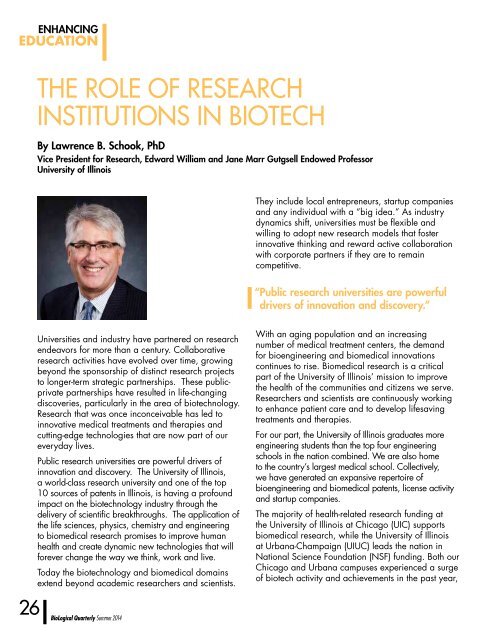BQ_-_14_-_Summer_2014
BQ_-_14_-_Summer_2014
BQ_-_14_-_Summer_2014
You also want an ePaper? Increase the reach of your titles
YUMPU automatically turns print PDFs into web optimized ePapers that Google loves.
ENHANCING<br />
EDUCATION<br />
THE ROLE OF RESEARCH<br />
INSTITUTIONS IN BIOTECH<br />
By Lawrence B. Schook, PhD<br />
Vice President for Research, Edward William and Jane Marr Gutgsell Endowed Professor<br />
University of Illinois<br />
driving the growth of our local, national and global<br />
economies. In fiscal year 2013, the University of<br />
Illinois approached nearly $1 billion in federally<br />
sponsored research expenditures. By placing a<br />
significant investment in scientific research, the<br />
University is positioned to join forces with the best<br />
and most advanced industry partners.<br />
“In fiscal year 2013, the University of<br />
Illinois approached nearly $1 billion<br />
in federally sponsored research<br />
expenditures.”<br />
26<br />
Universities and industry have partnered on research<br />
endeavors for more than a century. Collaborative<br />
research activities have evolved over time, growing<br />
beyond the sponsorship of distinct research projects<br />
to longer-term strategic partnerships. These publicprivate<br />
partnerships have resulted in life-changing<br />
discoveries, particularly in the area of biotechnology.<br />
Research that was once inconceivable has led to<br />
innovative medical treatments and therapies and<br />
cutting-edge technologies that are now part of our<br />
everyday lives.<br />
Public research universities are powerful drivers of<br />
innovation and discovery. The University of Illinois,<br />
a world-class research university and one of the top<br />
10 sources of patents in Illinois, is having a profound<br />
impact on the biotechnology industry through the<br />
delivery of scientific breakthroughs. The application of<br />
the life sciences, physics, chemistry and engineering<br />
to biomedical research promises to improve human<br />
health and create dynamic new technologies that will<br />
forever change the way we think, work and live.<br />
Today the biotechnology and biomedical domains<br />
extend beyond academic researchers and scientists.<br />
They include local entrepreneurs, startup companies<br />
and any individual with a “big idea.” As industry<br />
dynamics shift, universities must be flexible and<br />
willing to adopt new research models that foster<br />
innovative thinking and reward active collaboration<br />
with corporate partners if they are to remain<br />
competitive.<br />
“Public research universities are powerful<br />
drivers of innovation and discovery.”<br />
With an aging population and an increasing<br />
number of medical treatment centers, the demand<br />
for bioengineering and biomedical innovations<br />
continues to rise. Biomedical research is a critical<br />
part of the University of Illinois’ mission to improve<br />
the health of the communities and citizens we serve.<br />
Researchers and scientists are continuously working<br />
to enhance patient care and to develop lifesaving<br />
treatments and therapies.<br />
For our part, the University of Illinois graduates more<br />
engineering students than the top four engineering<br />
schools in the nation combined. We are also home<br />
to the country’s largest medical school. Collectively,<br />
we have generated an expansive repertoire of<br />
bioengineering and biomedical patents, license activity<br />
and startup companies.<br />
The majority of health-related research funding at<br />
the University of Illinois at Chicago (UIC) supports<br />
biomedical research, while the University of Illinois<br />
at Urbana-Champaign (UIUC) leads the nation in<br />
National Science Foundation (NSF) funding. Both our<br />
Chicago and Urbana campuses experienced a surge<br />
of biotech activity and achievements in the past year,<br />
The University of Illinois places a strong emphasis<br />
on interdisciplinary research and corporate<br />
partnerships. Combined, these synergic activities<br />
support a collaborative approach to solving some<br />
of the world’s most pressing problems. A significant<br />
amount of research, commercialization, startup<br />
activity and collaborative endeavors between<br />
universities and private industry have been<br />
developed in the biomedical and bioengineering<br />
disciplines.<br />
Elevating Ideas<br />
The Office of the Vice President for Research at the<br />
University of Illinois is responsible for advancing<br />
the economic development mission of the University<br />
by elevating ideas and innovations into sustainable<br />
technologies. Through our innovation pipeline, we<br />
protect, fund and support ideas prior to launching<br />
as viable business solutions.<br />
The EnterpriseWorks incubators support faculty and<br />
community entrepreneurs with new ideas seeking<br />
to start companies. Located on the Chicago and<br />
Urbana-Champaign campuses, EnterpriseWorks<br />
offers a broad range of services and programs<br />
designed to launch technology-based startups into<br />
sustainable businesses. These incubators have<br />
played a significant role in the development of<br />
biotech companies and are the cornerstones of<br />
the entrepreneurial ecosystem in their respective<br />
communities.<br />
Author Dr. Larry Schook on the “DNA” staircase at the University<br />
of Illinois at Chicago (UIC).<br />
EnterpriseWorks Chicago<br />
A “startup for startups,” EnterpriseWorks<br />
Chicago (EWC) is charged with creating a<br />
robust entrepreneurial community to nurture<br />
commercialization and accelerate viable hightechnology<br />
startups throughout the Chicagoland<br />
community. EWC coordinates and fosters five<br />
pillars of vibrant entrepreneurial ecosystems—<br />
infrastructure, innovation, talent, networks and<br />
capital.<br />
The flagship initiative of EWC is the Health,<br />
Technology and Innovation (HTI) facility, a proof-ofconcept<br />
center for therapeutics, devices, diagnostics<br />
and information technology. Located in the Illinois<br />
Medical District, the nation’s largest urban medical<br />
district, HTI is the first shared laboratory space<br />
for early-stage entrepreneurs in Chicago. It brings<br />
scientists, clinicians, engineers and industry together<br />
in support of an interdisciplinary approach to drug,<br />
diagnostic, device and information technology<br />
development.<br />
“The EnterpriseWorks incubators<br />
support faculty and community<br />
entrepreneurs with new ideas seeking<br />
to start companies.”<br />
BioLogical Quarterly <strong>Summer</strong> 20<strong>14</strong><br />
27


